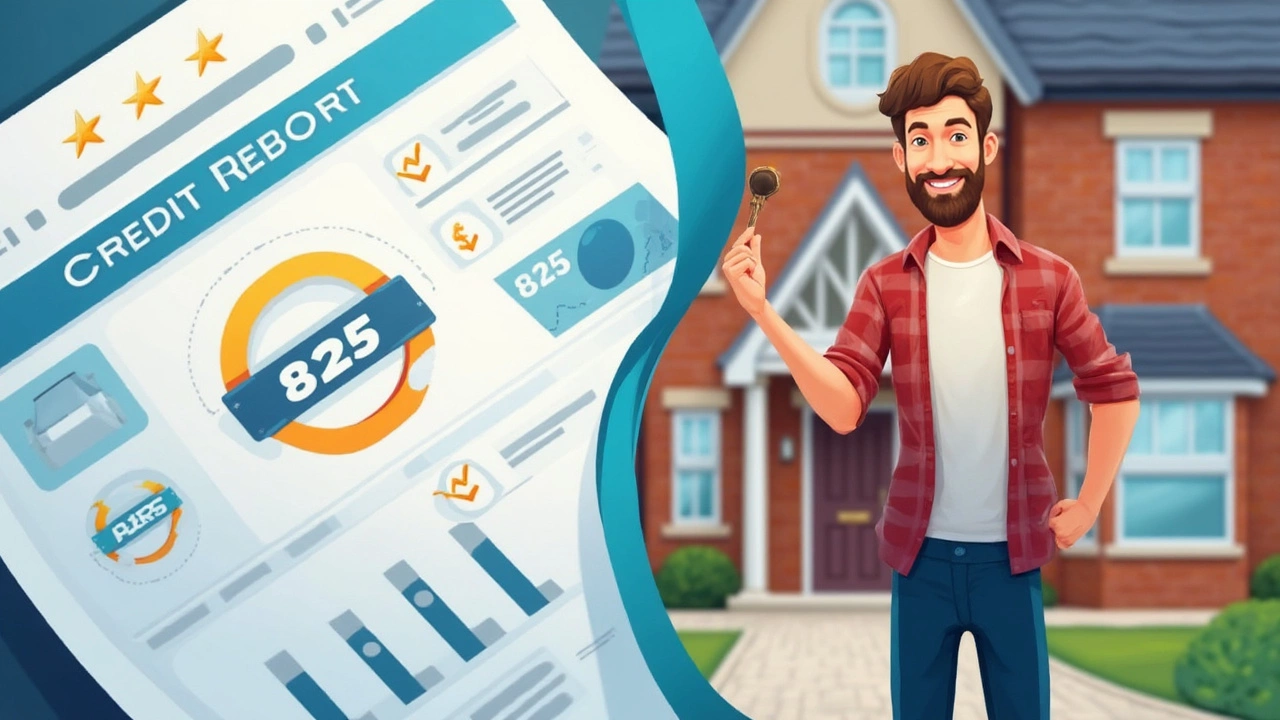If you’ve peeked at your credit report lately and your score says 825, you’re not just doing well—you’re basically in the credit score version of the VIP lounge. Only about 1-2% of people ever see a number this high. For first time home buyers, this isn’t just bragging rights—it can actually open a lot of doors (sometimes literally, if we’re talking about new house keys).
So, what does 825 get you? Lenders see you as ultra-reliable—think of it like getting picked first for dodgeball. Mortgage applications are usually way smoother, and you get to see the best interest rates out there. You might be surprised, though, that once you’re above 760, there aren’t always big rewards for every extra point. Still, who wouldn’t rather lenders fighting to offer you deals instead of the other way around?
- Just How Rare Is an 825 Credit Score?
- What an 825 Score Means for First-Time Buyers
- Perks (and Limits) When Shopping for a Mortgage
- How to Keep (or Reach) That Elite Score
- Real Life: Does 825 Change the Home Buying Game?
Just How Rare Is an 825 Credit Score?
An 825 credit score puts you way above the crowd—seriously, it’s pretty much the top shelf. On typical scoring systems like FICO (which goes from 300 to 850), you’re sitting just 25 points from perfect. If you’re wondering how rare that is, here’s the deal: less than 2% of U.S. adults carry a score at 825 or higher. That means almost everyone you know probably isn’t in this club.
Most people have much lower scores. The 2024 Experian study showed the average American’s FICO score was 718, so 825 is not just a little better—it’s leaps ahead. Check this out:
| Score Range | Percentage of U.S. Adults |
|---|---|
| 800-850 | ~22% |
| 750-799 | 21% |
| 700-749 | 17% |
| 600-699 | 18% |
| Below 600 | 22% |
The kicker: while about 22% manage to get above 800, hardly anyone hits 825, and even fewer stay there, since credit scores move up and down with new loans, credit cards, late payments, or even running up a balance during holiday shopping. It’s not just rare, it’s tough to keep up.
To put it straight, if you’re rocking an 825 credit score, you’re ahead of around 98 out of 100 other Americans. For a first time home buyer, this isn’t just a number—it’s basically a fast pass for the home loan line. But as impressive as that sounds, what really matters is how lenders act when they see a score this high. That’s where the magic kicks in for first timers.
What an 825 Score Means for First-Time Buyers
If you’re a first-time buyer with an 825 credit score, you’re setting yourself up for a pretty smooth ride when it comes to loan applications. Lenders use your credit score to figure out how risky it is to let you borrow, and with a score like 825—which the FICO model rates as “Exceptional”—they’re not sweating much over you.
For most mortgages, even a score above 760 puts you in the top tier for loan offers, so hitting 825 means you’re more than covered. That translates into easier pre-approvals, less grilling about your finances, and paperwork that’s way less stressful. You’ll almost always qualify for the lowest advertised interest rates and smallest down payment requirements that banks offer. That can add up to thousands saved over the life of your mortgage and frees up cash for things like moving costs, furniture, or those sneaky closing fees that pop up.
If you’re worried about things like private mortgage insurance (PMI), here’s some good news: your high score makes it way more likely you can skip PMI if you’ve saved up at least a 20% down payment. Even if you can’t quite hit that number, the PMI you pay is likely to be way lower.
Another upside is wiggle room for negotiations. Some lenders might offer to cover certain fees, throw in faster closings, or compete for your business because they want ultra-reliable borrowers like you. And if rates drop six months down the line, your strong credit usually makes refinancing fast and easy too.
The only real catch? Don’t expect special treatment once you pass the 760 mark—most lenders treat anything over that the same, so 825 is impressive but 780 often gets just as good a deal. Still, no one ever regrets having lenders excited to work with them, especially your first time out shopping for a place of your own.

Perks (and Limits) When Shopping for a Mortgage
Walking into the mortgage process flashing an 825 credit score is almost like showing up to a car dealership with cash in hand. Lenders want your business, and they know you're low-risk. Here’s what that actually means for you:
- Lowest interest rates: Most lenders reserve their best rates for people scoring 760 and above. With 825, you’re in the top tier, so you’ll likely get the lowest advertised rates—sometimes saving you tens of thousands over the life of your loan.
- More lender flexibility: You can shop around and even negotiate on points, fees, or closing costs. Some lenders might sweeten the deal, knowing you could just as easily go somewhere else.
- Smoother approvals: Less paperwork, fewer questions, and faster approvals are common. Lenders don’t have big worries about someone with your track record.
But there are some limits to what your score unlocks. Once your score jumps over 760, the difference between, say, 770 and 825 is barely noticeable to most banks when it comes to rates or loan products. Other stuff—like your debt-to-income ratio, job history, and down payment amount—still matters a lot.
You might expect some extra perks, but the reality is, mortgage companies cap the best deals pretty early:
| FICO Score Range | Average 30-Year Fixed Rate* | Loan Options Impact |
|---|---|---|
| 760-850 | 6.00% | Best rates, lowest fees |
| 700-759 | 6.30% | Almost as good, but not top-tier |
| 680-699 | 6.55% | Some extra fees, slightly higher rates |
| 620-679 | 7.10% | More requirements, higher rates |
*Rates based on national averages as of early 2025. Actual rates may vary.
Pro tip: Even if you already have an 825, don’t just settle for the first offer. Different banks and credit unions treat high scorers a little differently. Shop around and see how much those points can really save you—not all perks show up in the interest rate alone!
How to Keep (or Reach) That Elite Score
Reaching an 825 credit score isn’t magic, but once you’re there—or creeping close—you’ve got to work to keep it. If you’re chasing this number because you’re a first time home buyer, you’ll want to know exactly what that means for your future mortgage and why every point counts.
Here’s what’s usually true about people with a score this high: they never miss payments, they don’t run up credit card balances, and they’re good at not overdoing it with new credit. The biggest thing is consistency—credit scoring models like FICO and VantageScore love to see steady, boring habits.
- Never pay late—ever. Payment history is about 35% of your score. Even one slip can set you back years.
- Keep your credit card balances low. People with 825 credit score usually use less than 7% of their limits. That means if you have a $10,000 total limit, staying under $700 is golden.
- Don’t open a bunch of new accounts. Each new application means a hard inquiry, and even small dings matter at the top.
- Length of credit history matters. The longer you’ve got accounts in good standing, the better. Don’t rush to close old cards you never use—instead, set one to autopay a small bill to keep it active.
- Mix it up. If you only have credit cards, think about whether a small loan (auto, student, or personal) makes sense for you down the road.
People sometimes forget, credit scores also react to sudden life changes—like job loss, emergencies, or even just a big new loan. If you’re planning a home purchase, hold steady for a few months before your mortgage application. Don’t start moving huge amounts or closing old accounts right before your lender starts looking.
Want real numbers? Check out this example of what makes up your score:
| Factor | Average High-Score Value | Weight in Score |
|---|---|---|
| On-time Payments | 99-100% | 35% |
| Credit Utilization | 5-7% | 30% |
| Credit Age | 10+ years | 15% |
| Account Mix | 3+ types | 10% |
| New Applications | Under 2 in last year | 10% |
If you’re not at 825 yet, small habits matter more than one-time hero moves. Building or keeping that elite score is a marathon, not a sprint. If you ever slide, don’t panic—consistency really is your secret weapon. I’ve reminded my own Nolan more than once: boring financial habits tend to pay off big time when it’s finally time to buy something huge, like a home.

Real Life: Does 825 Change the Home Buying Game?
If you walk into a bank or start an online loan application with an 825 credit score, you’ve basically got a golden ticket. Mortgage lenders see very few applicants with scores this high. According to Experian’s 2024 data, only about 1.5% of American adults land in the 820-plus range. So, you’ll definitely stand out from the crowd—like, top-of-the-class standout.
But here’s the thing: the mortgage world doesn’t give special badges for every single point over 760. Whether your score is 761 or 825, both get you lumped into the “excellent” bracket, which unlocks the best offers. That said, 825 does still matter in ways you might not expect:
- Fast-Track Approvals: Lenders will likely process your application quicker, with fewer questions or requests for extra paperwork. Their risk calculation models throw confetti when they see an 825.
- Negotiation Power: You’re more likely to get exceptions for things like waiving some fees, lower private mortgage insurance (PMI), or even a slightly larger loan if you’re pushing it.
- No Sweat with Multiple Inquiries: You can shop around with several lenders and not worry about your score taking a big hit. Hard inquiries barely leave a scratch on an 825, and mortgage inquiries get grouped together anyway if done within a short window.
Now, would an 825 actually get you a better interest rate than someone with a 780? Often, no—the “prime” bucket usually tops out around 760. But at the edges, certain lenders competing for the best customers might throw in perks, like faster closings or minor discounts on closing costs, especially at credit unions or local banks trying to get your business.
Here’s a quick look at average mortgage rates by credit score (with estimates from FICO 2025):
| Credit Score | Average 30-Year Fixed Rate |
|---|---|
| 760+ | 6.05% |
| 700-759 | 6.32% |
| 660-699 | 6.57% |
| 620-659 | 7.11% |
If you’re buying in a competitive market, sellers and realtors will love seeing a pre-approval letter from someone with a score like yours. It shows that your deal is way less likely to fall through. More than once, I’ve seen sellers pick an offer from an 800-plus buyer, even if the price was a tiny bit lower, just because it looked so solid.
One last thing: don’t get cocky. Even with a sky-high score, lenders still double-check your income, job situation, and debts. An 825 isn’t a free pass if you’ve got shaky employment or if your debt-to-income ratio is off. But if everything else lines up, home buying with this score? Way easier, with fewer headaches, and more room to steer the process your way.
